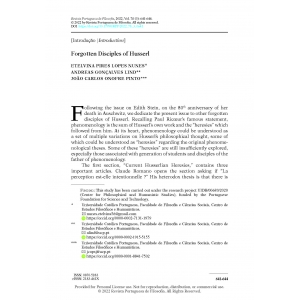| Abstract |
Following the issue on Edith Stein, on the 80th anniversary of her death in Auschwitz, we dedicate the present issue to other forgotten disciples of Husserl. Recalling Paul Ricœur’s famous statement, phenomenology is the sum of Husserl’s own work and the “heresies” which followed from him. At its heart, phenomenology could be understood as a set of multiple variations on Husserl’s philosophical thought, some of which could be understood as “heresies” regarding the original phenomenological theses. Some of these “heresies” are still insufficiently explored, especially those associated with generation of students and disciples of the father of phenomenology. The first section, “Current Husserlian Heresies,” contains three important articles. Claude Romano opens the section asking if “La perception est-elle intentionnelle ?” His heterodox thesis is that there is no intentionality of perception in the sense that there is an intentionality of memory or imagination. Next, based on Marleau-Ponty and Levinas, Emmanuel Falque argues that phenomenology must be in relationship with non-phenomenology, inviting contemporary phenomenologists to enquire what is outside the phenomenon (hors-phénomène). To conclude this first section, Pascal Ide presents “Prolégomènes à une métaphysique de l’amour. Sources et ressources,” arguing that metaphysics is completed with the question of disinterested love, because it is this experience of reciprocity and communion that is aimed at by the intentionality of the human person. In the second section, “Husserl’s Context and Early Disciples,” we present five articles. In “Como Husserl chegou ao idealismo transcendental? Uma leitura de Roman Ingarden,” Elias Francisco Fontele Dourado clarifies the reasons that led Husserl to transcendental idealism. Afterwards, in “Revisiting Reinach and the Early Husserl. For a Phenomenology of Communication,” Pedro M. S. Alves argues that Husserl’s approach, with respect to the intentional structure of communicative intentions, is “very close to a full-fledged theory of communicative intentions in the years around 1910,” leading to the same problems. In this way, the author suggests a solution based on “Reinach’s theory of the Vernehmung.” The following article, called “A Importância dos Modelos para o Florescimento Humano. O Contributo de Dietrich von Hildebrand,” is written by Eugénio Lopes. This is a defense of the realist phenomenology of Dietrich von Hildebrand, based on its capacity to support the application of models that promote human virtues and social development. This is followed by “How to See the Essential. Hedwig Conrad Martius’ Theory of Representation,” in which Daniel Neumann argues that Conrad-Martius’ theory of representation is able to free itself from modernity’s own dilemma between idealism and realism. Up next, Jimmy Hernández Marcelo’s article, “Koyré y Husserl: De las matemáticas a la fenomenología,” shows, by analyzing Alexandre Koyré’s work in the genesis of its historical context, the continuity and complementarity of the initial development of phenomenology with the progress in mathematics. In the third section, focused on “Husserl’s Critical Phenomenologists,” we start by presenting the article “Göttingen contra Husserl: The Transcendental Turn and its Discontents.” The author, Victor Portugal, analyzing important criticisms that Husserl’s students addressed to him, concerning the possibility of a pure consciousness and the method by reductions, leads us to the understanding of how Husserl improved his work towards a “mature transcendental idealism which came to express the real meaning of phenomenology.” Afterwards, in “Shestov, anti-discípulo de Husserl,” Ángel Viñas Vera analyzes the way Shestov received Husserl’s phenomenology in the French context. In doing so, the author shows how Shestov changed the way Husserl took on the relationship between the universal and the particular and between truth and freedom, opening the horizon to atypical phenomenologies, which flourished in a Francophone environment. Next, we present two articles on the Sartrian critique of Husserl: “La ricezione critica del pensiero husserliano nel primo Sartre. Intenzionalità, Ego e coscienza” by Ciro Adinolfi and “Ego na fenomenologia. Crítica de Sartre ao Ego transcendental de Husserl” by Pedro Dias. While the first illuminates the way in which Sartre appropriated Husserl’s notions of phenomenology, namely intentionality, clarifying their meaning, the second article shows the importance of Sartre, insofar as he shows that the Husserlian ego is a “product” of the conscience itself. In the final addendum, we present an article situated in the field of theology: “What Can Wojtyła’s Ethics Speak to the Abuse Crisis?” With this analysis, Rebecca Pawloski and Andreas Gonçalves Lind seek to extract from Wojtyla’s ethics lessons for the contemporary Church with regard to the abuse crisis. Independently of his action as Supreme Pontiff, the ethics of his philosophical work, inspired by Max Scheler’s phenomenology, makes it possible to understand various causes and to find preventive measures impacting the way in which abuse is understood within the context of the Church. |
|---|









